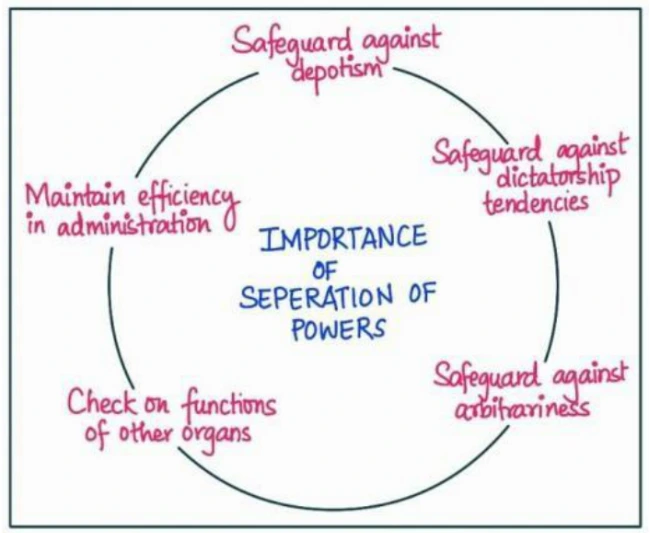Answer:
|
How to approach the question
- Introduction:
- Write about the separation of power in the Indian union.
- Body
- Highlight the character of India’s separation of power.
- Write about the significance of checks and balances.
- Conclusion
- Write a balanced conclusion.
|
Introduction
Separation of powers is a principle that divides the functions and powers of government into separate branches, namely the legislature, executive, and judiciary. This division ensures that no single branch has complete control and authority, preventing the abuse of power.
Body
In India, strict adherence to the separation of powers is not followed as evident from various provisions in the Indian Constitution.
- Appointment of key positions: The executive branch, represented by the President, appoints the Prime Minister and other members of the Council of Ministers, influencing the functioning of the legislative branch.
- This power allows the executive to have a significant influence on the functioning of the legislative branch.
- Executive involvement in legislation: The President’s assent is required for a bill to become law, giving the executive a role in the legislative process.
- Judicial review: The judiciary exercises the power of judicial review, enabling it to declare laws or executive actions as unconstitutional, encroaching upon the legislative domain.
 Judicial Activism: The judiciary sometimes goes beyond interpretation and ventures into law-making and implementation, seen in cases such as banning old diesel vehicles and imposing restrictions on the sale of liquor along highways.
Judicial Activism: The judiciary sometimes goes beyond interpretation and ventures into law-making and implementation, seen in cases such as banning old diesel vehicles and imposing restrictions on the sale of liquor along highways.- Conduct of judges cannot be discussed in the legislature, ensuring judicial independence and Legislators enjoy immunity from court questioning for their speech and vote, safeguarding parliamentary privilege.
This ensures that no single branch has unchecked authority. Each branch operates within its designated sphere. This principle is rooted in the belief that concentrating power in one person or group can lead to abuse and undermine the principles of justice and accountability.
Significance of checks and balances in India:
- Protection of Democracy: Separation of powers prevents power concentration, maintaining a democratic system (e.g., India’s legislature, executive, and judiciary).
- Checks and Balances: Executive accountability to the legislature is seen in budget approval, ensuring transparency.
- Safeguarding Fundamental Rights: Judiciary’s judicial review protects rights (e.g., decriminalizing same-sex relationships).
- Effective Governance: Each branch specializes in its function, leading to efficient governance.
- Constitutional Stability: Separation of powers maintains the integrity of the constitutional framework.
- Protection of Judicial Independence: Separation of powers ensures unbiased decisions by the judiciary.
- Mitigation of Corruption: Checks and balances create accountability, reducing corruption risks.
- Promotion of Legislative Oversight: Separation of powers allows effective scrutiny of the executive by the legislature.
- Facilitation of Specialization: Each branch’s specialization enhances decision-making and expertise.
- Preservation of Federalism: Separation of powers balances central and state government powers.
- Protection against Executive Overreach: Prevents one branch from dominating and safeguards against misuse of power.
- Promotion of Public Confidence: Separation of powers fosters trust in democratic institutions, transparency, and prevents authoritarian rule.
Conclusion
The principle of ‘checks and balances’ got more prominent after the Minerva Mills case where the judiciary held that judicial review is a basic feature of the Constitution. Overall, it ensures that no organ of the state becomes too powerful which cannot be contained by other organs in the constitutional framework.
To get PDF version, Please click on "Print PDF" button.
 Judicial Activism: The judiciary sometimes goes beyond interpretation and ventures into law-making and implementation, seen in cases such as banning old diesel vehicles and imposing restrictions on the sale of liquor along highways.
Judicial Activism: The judiciary sometimes goes beyond interpretation and ventures into law-making and implementation, seen in cases such as banning old diesel vehicles and imposing restrictions on the sale of liquor along highways.
Latest Comments